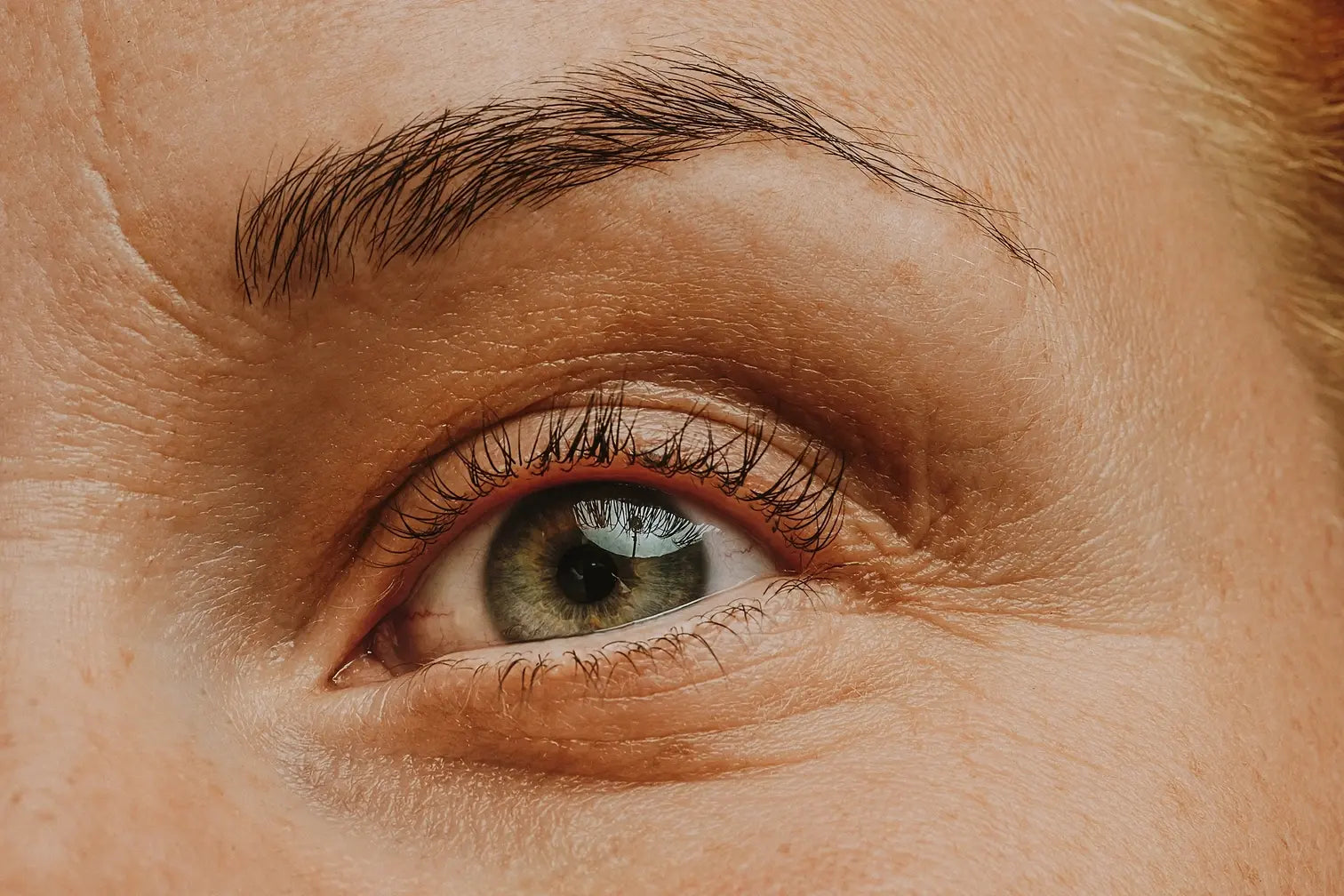What causes crepey skin under the eyes?
- Alcohol consumption: Since alcohol causes dehydration and exacerbates inflammation in the skin, it can accelerate the aging process and the development of crepey skin [1].
- Smoking: Much like UV rays, smoking damages collagen and elastin fibers in the skin, leading to the accelerated development of fine lines, wrinkles, and crepey skin [2].
- Stress: An increase of cortisol in the body has been linked to a decrease in collagen production. With less collagen to provide structure to the skin, the development of crepiness can become enhanced [3].
- Unbalanced diet: When a diet is lacking in essential nutrients, in particular vitamin C and antioxidants, the skin is unable to properly maintain its strength, leading to an enhanced crepey skin texture [1].
- Poor sleeping habits: The body produces collagen and repairs tissue during sleep, so inadequate sleep can result in a weakened skin barrier [4].
- Age: As the body naturally ages, collagen synthesis becomes less efficient, resulting in crepey skin texture [5]. For women, this is especially true. Since estrogen stimulates collagen biosynthesis, the decrease in estrogen production that accompanies menopause causes a marked decrease in collagen production [6].
What causes crepey skin under the eyes?
- Alcohol consumption: Since alcohol causes dehydration and exacerbates inflammation in the skin, it can accelerate the aging process and the development of crepey skin [1].
- Smoking: Much like UV rays, smoking damages collagen and elastin fibers in the skin, leading to the accelerated development of fine lines, wrinkles, and crepey skin [2].
- Stress: An increase of cortisol in the body has been linked to a decrease in collagen production. With less collagen to provide structure to the skin, the development of crepiness can become enhanced [3].
- Unbalanced diet: When a diet is lacking in essential nutrients, in particular vitamin C and antioxidants, the skin is unable to properly maintain its strength, leading to an enhanced crepey skin texture [1].
- Poor sleeping habits: The body produces collagen and repairs tissue during sleep, so inadequate sleep can result in a weakened skin barrier [4].
- Age: As the body naturally ages, collagen synthesis becomes less efficient, resulting in crepey skin texture [5]. For women, this is especially true. Since estrogen stimulates collagen biosynthesis, the decrease in estrogen production that accompanies menopause causes a marked decrease in collagen production [6].
What are effective methods for managing crepey skin under the eyes?
What are effective methods for managing crepey skin under the eyes?
How can you prevent crepey skin from forming under and around your eyes?
How can you prevent crepey skin from forming under and around your eyes?
What are the most common treatments for healing crepey skin under the eyes?
What are the most common treatments for healing crepey skin under the eyes?
How can you tell early on if you are developing crepey skin under your eyes?
How can you tell early on if you are developing crepey skin under your eyes?
Can topical supplements help heal crepey skin?
Can topical supplements help heal crepey skin?
- Crepey skin is primarily caused by sun damage, and can be further enhanced by alcohol consumption, smoking, stress, a poor diet, poor sleeping habits, and age.
- Wrinkles, dull skin, and dark circles are the first signs of crepey skin developing beneath the eyes.
- Topical skin care products that help enhance collagen synthesis may reduce crepey skin at the source.
- Crepey skin is primarily caused by sun damage, and can be further enhanced by alcohol consumption, smoking, stress, a poor diet, poor sleeping habits, and age.
- Wrinkles, dull skin, and dark circles are the first signs of crepey skin developing beneath the eyes.
- Topical skin care products that help enhance collagen synthesis may reduce crepey skin at the source.
- https://www.ncbi.nlm.nih.gov/pmc/articles/PMC6081583/
- https://www.ncbi.nlm.nih.gov/pmc/articles/PMC6715121/
- https://www.ncbi.nlm.nih.gov/pmc/articles/PMC4082169/
- https://pubmed.ncbi.nlm.nih.gov/25266053/
- https://pubmed.ncbi.nlm.nih.gov/16723701/
- https://pubmed.ncbi.nlm.nih.gov/33739464/
- https://www.ncbi.nlm.nih.gov/pmc/articles/PMC8347214/
- https://www.skincancer.org/skin-cancer-prevention/sun-protection/sunscreen/
- https://pubmed.ncbi.nlm.nih.gov/6723252/
- https://www.webmd.com/beauty/what-to-know-about-under-eye-fillers
- https://www.ncbi.nlm.nih.gov/pmc/articles/PMC6081583/
- https://www.ncbi.nlm.nih.gov/pmc/articles/PMC6715121/
- https://www.ncbi.nlm.nih.gov/pmc/articles/PMC4082169/
- https://pubmed.ncbi.nlm.nih.gov/25266053/
- https://pubmed.ncbi.nlm.nih.gov/16723701/
- https://pubmed.ncbi.nlm.nih.gov/33739464/
- https://www.ncbi.nlm.nih.gov/pmc/articles/PMC8347214/
- https://www.skincancer.org/skin-cancer-prevention/sun-protection/sunscreen/
- https://pubmed.ncbi.nlm.nih.gov/6723252/
- https://www.webmd.com/beauty/what-to-know-about-under-eye-fillers


